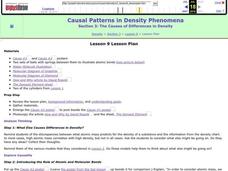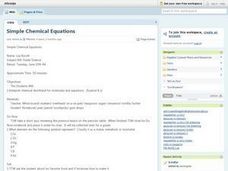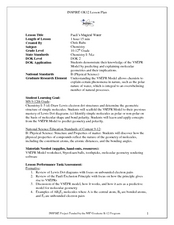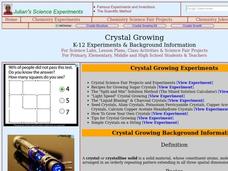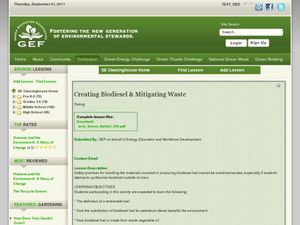Curated OER
The Causes of Differences in Density
Students explore what causes differences in density. They observe an models depecting atoms, compounds, and molecules. Students determine if there is air in between atomic bonds. They study the structure and spacing of molecular bonds.
Curated OER
Differentiate Elements, Compounds, and Mixtures
Pupils examine the differences between elements, compounds and mixtures. Using diagrams, they compare and contrast atoms and molecules and describe various chemical reactions. They distinguish the differences between ionic and covalent...
Curated OER
Simple Chemical Equations
Eighth graders interpret the chemical symbols and shorthand used for molecules and equations. Through guided practice, 8th graders work to decipher and interpret the symbols for chemical equations. An opportunity for independent...
Curated OER
Worksheet 2-2 Stoichiometric Tools
In this stoichiometry worksheet, students solve a variety of problems including finding empirical and molecular formulas, determining molarities of solutions, determining molecular weights of compounds and calculating the percent mass of...
Curated OER
Basic Chemistry Review
Students experiment to show their knowledge of molecules and atomic structures. In this chemistry review lesson students participate in an activity and then fill out a worksheet.
Curated OER
Carbon: Structure Matters
Young scholars read the Who We Are Section on Calfee Designs Webpage and discuss carbon usage. They work in pairs to look up the minerals diamond and graphite then create a chart on the properties of each mineral then compare how they...
Curated OER
Molecular Architecture
Students cuminate their study of molecular structure and bonding with this activity.
Curated OER
Ozone Tag
Students explain the role of stratospheric ozone and predict at least three ways in which depleted ozone would change her/his lifestyle. They then
describe the process by which chlorine or bromine compounds can break down ozone molecules.
Curated OER
Pauli's Magical Water
Students predict the shape of molecules using VSEPR theory. In this chemistry lesson, students differentiate a polar and nonpolar molecule. They discuss why water's polarity is very important.
Curated OER
Einstein's BIg Idea
Pupils discuss what the m in E=mc2 represent. They relate that mass in a chemical reaction is always conserved. Students convey that atoms rearrange themselves in chemical reactions to form different molecules and compounds.
Curated OER
Atmospheric Pressure
Ninth graders explore the abstract idea of the atom and explain the differences and similarities between solids, liquids, and gases. They understand the molecular differences between solids, liquids, and gases.
Curated OER
Chemical Formulas Unit-Day 4
The purpose of this lesson involves reviewing nomenclature and molecular
formulas as well as introducing naming molecular compounds and identifying acids. The students investigate and understand how conservation of energy
and matter is...
Curated OER
How Do Scientists Research For Lab Activities?
Students explore the nature of scientific knowledge. They will also explore how to develop a lab plan to explain the structures of molecules and atoms. Research is essential to the success of the lab using necessary educational software.
LABScI
Atomic Structure and the Periodic Table of Elements: The Secret Agent Lab
Food always gets attention! Model atomic structure using fruit loops to represent the subatomic particles. After building models, scholars create ionic bonds using their models. Finally, they use these concepts to create a periodic...
Curated OER
Survival Still
Lead your class to construct a solar still on campus to demonstrate how water can be extracted from the soil. The power of solar energy is emphasized, as is the concept of how capillary water can be recovered and purified by using a...
Curated OER
Heat Discrepancies
Students answer the question, "Why do Eskimos build houses out of ice to keep warm. Since heat goes from hot to cold, don¿¿¿t the ice walls take away the warmth inside the house?" They explain how snow or ice can actually be insulators.
Curated OER
Crystal Growing
Students explore the different phases of a crystal. In this mineral lesson students grow their own sugar crystals using a sugar recipe.
Curated OER
Creating Biodiesel and Mitigating Waste
Biotechnology pros produce their own biofuel using waste oil and fresh vegetable oil. They test the quality of their product using titration techniques and pH analysis. They write their observations and report their findings. Be aware...
Virginia Department of Education
A Crystal Lab
Young chemists grow ionic crystals, metallic crystals, and supersaturated crystals in three different lab experiments. Observing these under a microscope allows pupils to compare the various structures.
Kenan Fellows
Sensors in Chemistry
The Environmental Protection Agency monitors sensors to track air pollution and set clean air standards. Enthusiastic young scientists use similar sensors to gather data in their area and then apply the gas laws and conservation of...
Curated OER
Grow an Alum Crystal
What an exciting lab experiment to conduct with your high school chemistry class! Crystals are formed naturally in the environment. However, allow your blossoming chemists to create their own unique crystals using alum and...
Curated OER
Gases and Plasmas
Young scholars determine what plasma is and why the sun is made up of plasma. They recognize situations where plasmas are found in nature and made by man. They discuss why the sun is a huge ball of plasma and if there are different...
Chymist
Esters: An Introduction to Organic Chemistry Reactions
Scratch and sniff an introduction to organic chemical reactions. A creative lesson has individuals study the esters commonly used in scratch-and-sniff stickers and advertisements. Following the lab procedure, scholars create the organic...
Other popular searches
- Gumdrop Atoms and Molecules
- Counting Atoms Molecules
- Making Atoms and Molecules
- Atoms & Molecules Ppt
- Matter Atoms Molecules
- Science, Atoms and Molecules
- Science Atoms and Molecules
- Atoms Molecules Elements
- Atoms & Molecules Pot
- Atoms and Molecules Lesson
- Atoms Molecules Units
- Atoms and Molecules Musical
